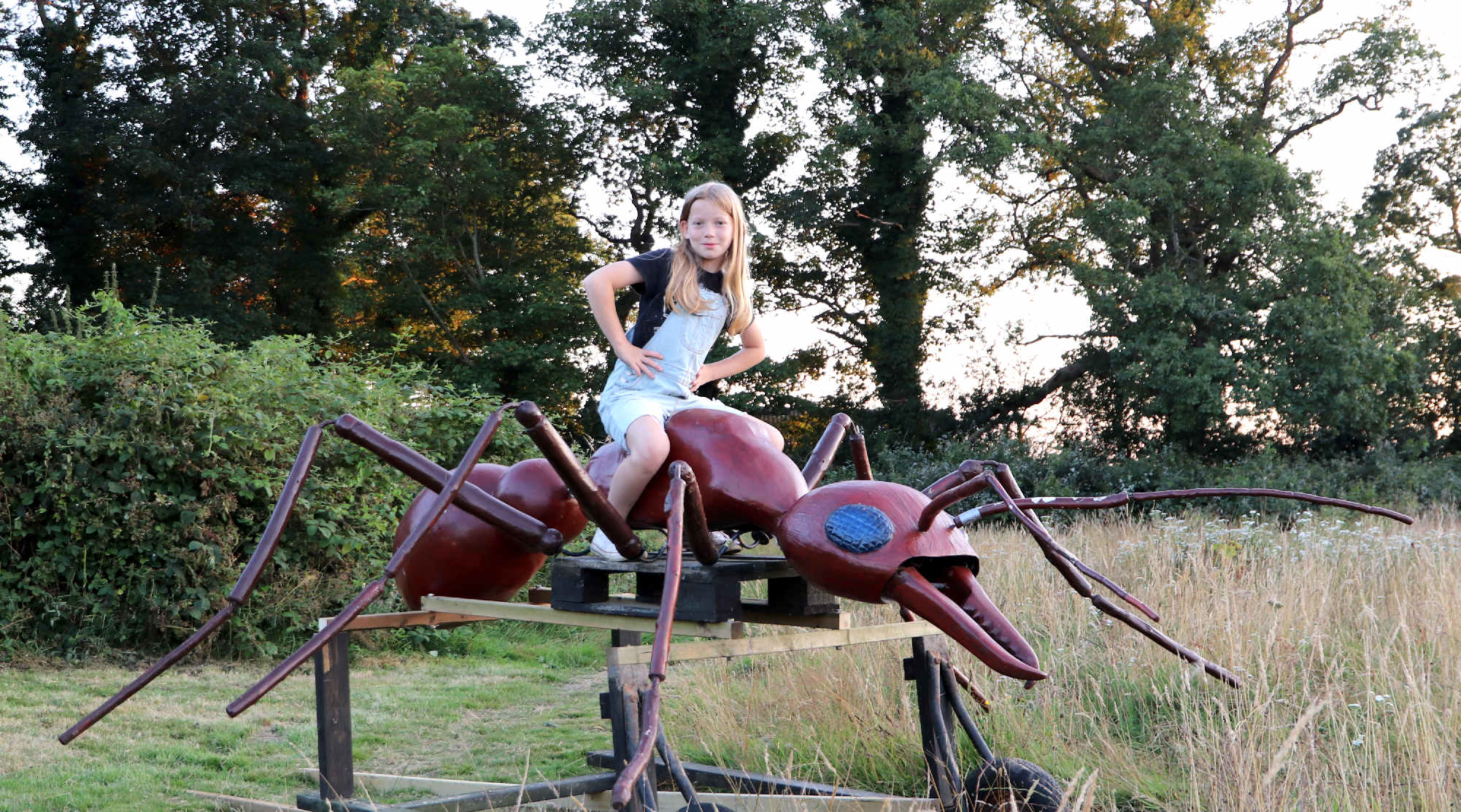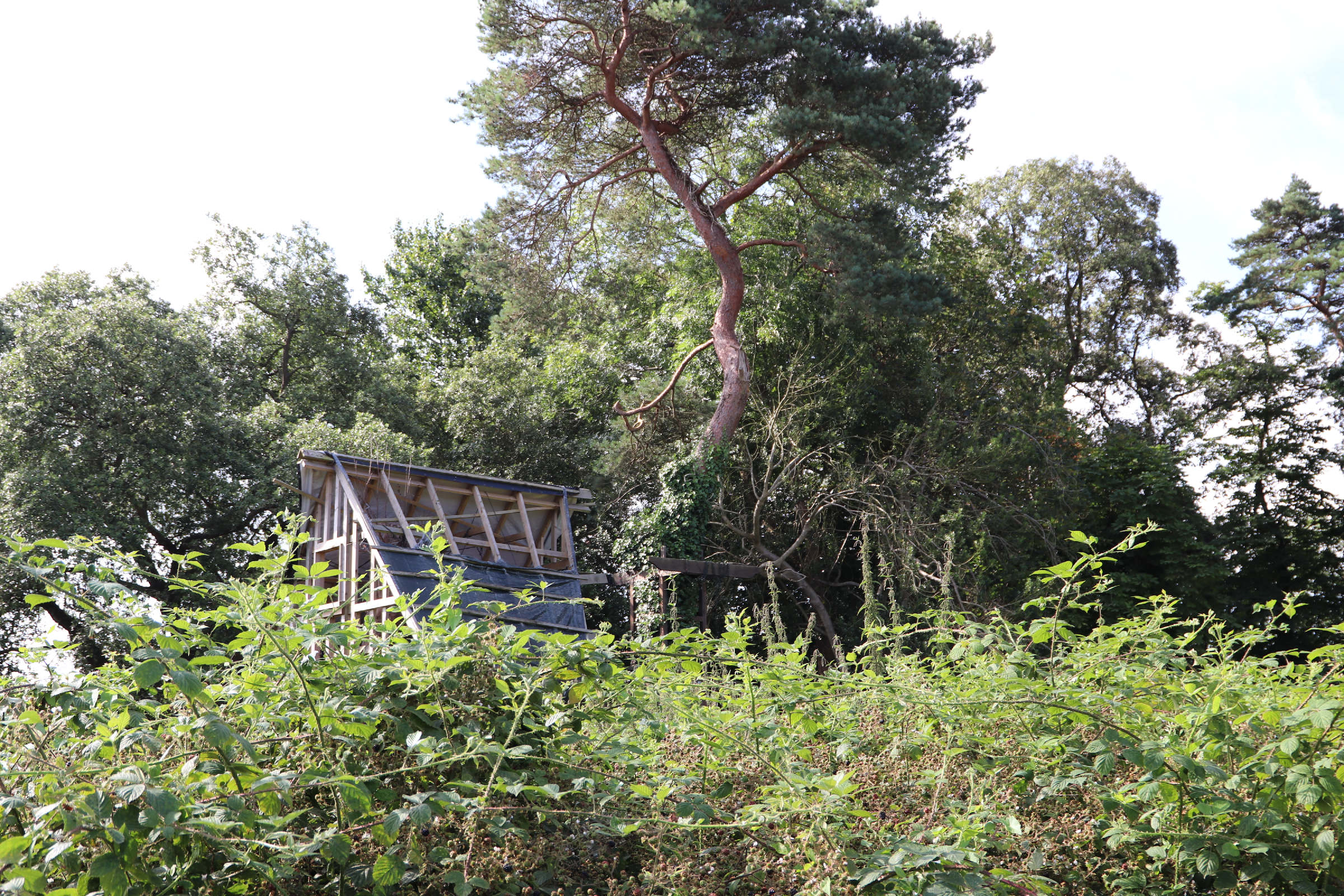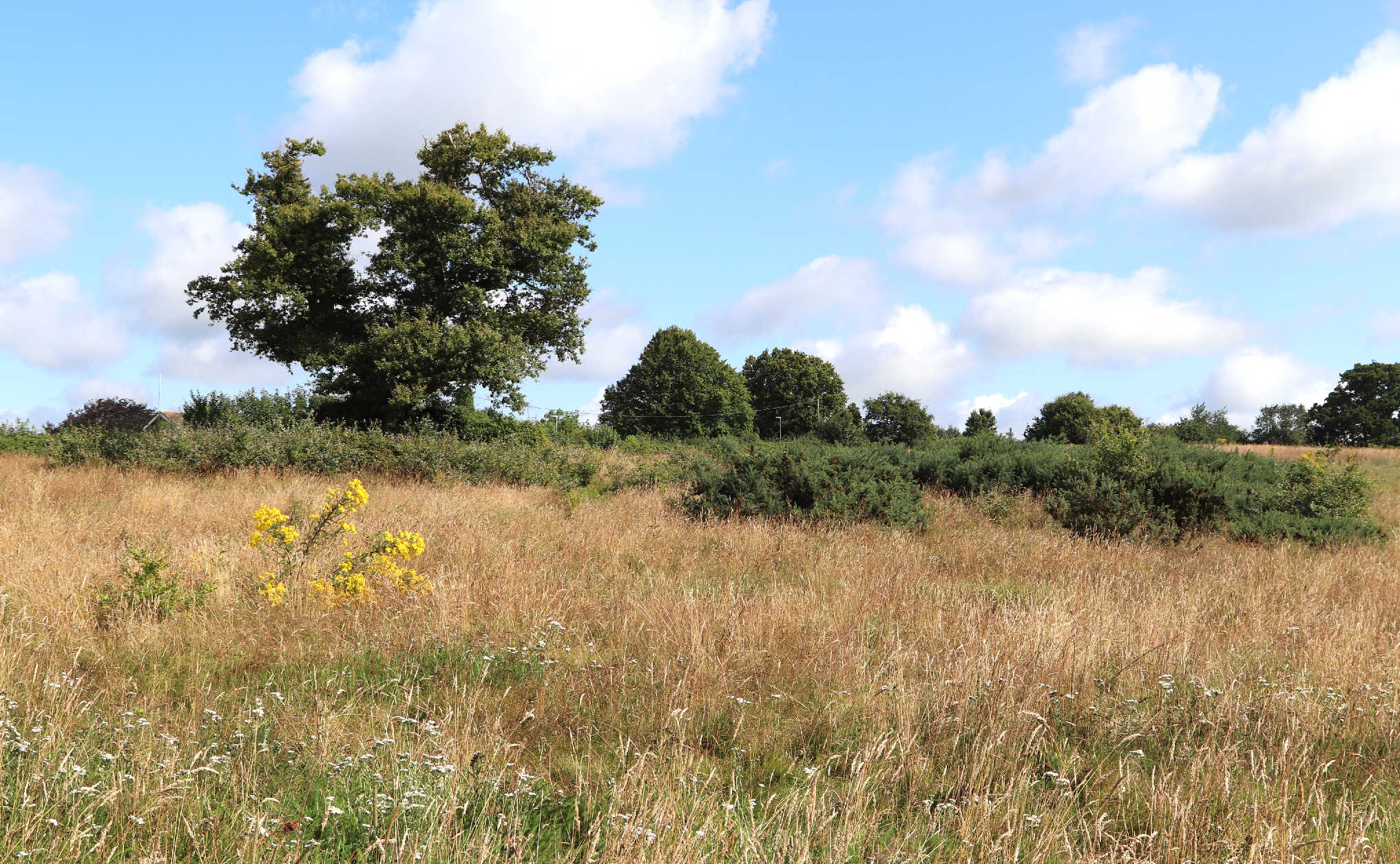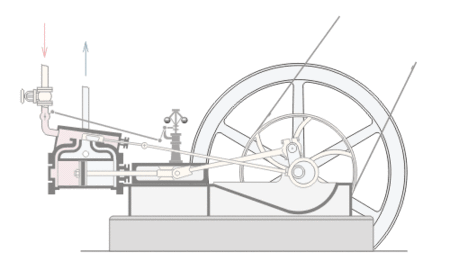
Is
this the world's largest insect? Anthony the giant 'Bulldog' ant is seen
here at the entrance to the Museum, with a young volunteer (Miss Ocean)
helper - who actually worked on the cart that Anthony sits on. 'Miss
Ocean' is a conservationist, keen on the country and rewilding, who also
hates ocean
plastic. But loves the humpback whales &
dolphins
that are forced to swim in our marine litter. She is also worried about climate
change that is warming the planet globally by burning fossil
fuels that make greenhouse gases.
In Wealden 47% of CO2 comes from transport, with another 35% from
housing. Yet, despite declaring a Climate Emergency, sustainable timber
flatpacks are non existent in the District, as are charging
points for EVs on newbuilds or along the high streets and in car
parks. Two obvious ways of lowering carbon footprints.
In
addition to the archaeology contained in the structure of the extant
generating station, the site, surrounding grounds and fields are at
present rewilding at a good rate. Naturally, we are very excited about
this. But it is not all smiles locally, where the Edwardians and
Georgians were not so much concerned with conservation, as building in
brick with clay tiles. In those days they built giant houses with tall
ceilings and chimneys that vented fireplaces in every room - that make
heating rooms expensive, flooding the atmosphere with carbon dioxide and
other greenhouse gases. They also liked ordered gardens, planted with
imported species. They hated weeds, tall grass, unkempt shrubs, holly
and ivy. The lifeblood of the re-wilding movement. The electricity
station is in Lime
Park, flanked by brick and clay tiled houses.
Fortunately, the adjacent field to the north is (at present) open
grassland with some trees on the borders.

BLENDING
IN - This roof started out as a legal requirement under Health
& Safety Regulations. Since there is a requirement to protect
visitors to the museum and workers, from falling
branches and trees. That unfortunately, the Scots Pine species is
prone to. The Scots pine (Pinus sylvestris) is an evergreen conifer native to northern Europe. Mature trees grow to 35m and can live for up to 700 years. The bark is a scaly orange-brown, which develops plates and fissures with age. Twigs are green-brown and hairless.
Apart from falling
branches, in high winds branches blown from adjacent
trees can be very dangerous. At present, the Museum has no beneficial
use to help pay for the upkeep of this important heritage asset.
Herstmonceux
Museum hosts an Innovation Hub, almost all of which exhibits
concern solar and electric vehicles. This is our contribution towards
Net Zero, in showing visitors how it is possible to think outside the
box, with the aim of inspiring climate engineers and entrepreneurs of
the future. Maybe even to inspire councillors and politicians yet to be
elected, that climate innovation should be nurtured and encouraged, with
demonstrable results in the form of three full size vehicles on display
with cartridge exchange (instant) refueling for BEVs and HFCEVs. This,
despite the innovator not receiving any kind of support from local
authorities. Imagine then the possibilities if future innovators are
supported. There is even a model of a hydrogen
truck refuelling station, derived from the cartridge based system,
named SmartNet™.

Now
that is what we call rewilding. The oak tree in the middle of this
field, and others dotted around the perimeter have been seeding rather
well. The tall grass and other shrubs are providing homes for much
wildlife. The hope is that, apart from footpaths and historic rights of
way, that this becomes a focal point for family walks, ramblers, hikers
and dog walkers in the village of Herstmonceux.
Since its origin, the term rewilding has been used as a signifier of particular forms of ecological restoration projects (or advocacy thereof) that have ranged widely in scope and geographic application. In 2021 the journal Conservation Biology published a paper by 33 coauthors from around the world. Titled, 'Guiding Principles for Rewilding'. Researchers and project leaders from North America
(Canada, Mexico and the United States) joined with counterparts in
Europe (Denmark,
France, Hungary, The Netherlands,
Switzerland, and the UK),
China, and South America
(Chile and Colombia) to produce a unifying description, along with a set of ten guiding principles.
The group wrote, 'Commonalities in the concept of rewilding lie in its aims, whereas differences lie in the methods used, which include land protection, connectivity conservation, removing human infrastructure, and species reintroduction or taxon replacement.' Referring to the span of project types they stated, 'Rewilding now incorporates a variety of concepts, including Pleistocene megafauna replacement, taxon replacement, species reintroductions, retrobreeding, release of captive-bred animals, land abandonment, and spontaneous rewilding.'
Empowered by a directive from the International Union for the Conservation of Nature to produce a document on rewilding that reflected a global scale inventory of underlying goals as well as practices, the group sought a 'unifying definition', producing the following:
'Rewilding is the process of rebuilding, following major human disturbance, a natural ecosystem by restoring natural processes and the complete or near complete food web at all trophic levels as a self-sustaining and resilient ecosystem with biota that would have been present had the disturbance not occurred. This will involve a paradigm shift in the relationship between
humans and nature. The ultimate goal of rewilding is the restoration of functioning native ecosystems containing the full range of species at all trophic levels while reducing human control and pressures. Rewilded ecosystems should
- where possible - be self-sustaining. That is, they require no or minimal management (i.e., natura naturans [nature doing what nature does]), and it is recognized that ecosystems are dynamic.'
TEN PRINCIPLES DEVELOPED BY THE GROUP
1. Rewilding utilizes wildlife to restore trophic interactions.
2. Rewilding employs landscape-scale planning that considers core areas, connectivity, and co-existence.
3. Rewilding focuses on the recovery of ecological processes, interactions, and conditions based on reference ecosystems.
4. Rewilding recognizes that ecosystems are dynamic and constantly changing.
5. Rewilding should anticipate the effects of climate change and where possible act as a tool to mitigate impacts.
6. Rewilding requires local engagement and support.
7. Rewilding is informed by science, traditional ecological knowledge, and other local knowledge.
8. Rewilding is adaptive and dependent on monitoring and feedback.
9. Rewilding recognizes the intrinsic value of all species and ecosystems.
10. Rewilding requires a paradigm shift in the coexistence of humans and nature.
A paper was published in 2024 that offered a "broad study of rewilding guidelines and interventions."
REWILDING
AND CLIMATE CHANGE
Large mammals can influence ecosystems by altering biogeochemical pathways as they contribute to unique ecological roles, they are landscape engineers that aid in shaping the structure and composition of natural habitats. Rewilding can mitigate global
climate change by restoring ecosystems. An example of this would be rewilding pasture land, thereby reducing the number of cows and sheep and increasing the number of
trees. Wood is
good.
The long-term shifts in weather pattern and temperature reflect a range of changes from threatening
biodiversity to ecosystem functioning. Large herbivores and carnivores contribute to key processes to influence
climate change mediation and adaptation across terrestrial ecosystems. Rewilding enhances ecosystem functioning and services by long term maintenance of carbon stocks. The most beneficial effects on biogeochemical cycling and ecosystem structure are reported through rewilding large herbivore species.
Trophic rewilding can enhance the carbon capture and storage of ecosystems and has been posited as a "natural climate solution". The functional roles animals perform in an ecosystem, such as grazing, nutrient cycling and seed distribution, can influence the amount of carbon soils and plants capture in both marine and terrestrial environments. The carbon cycle is altered through herbivores consuming vegetation and assimilating carbon within their own biomass, releasing additional carbon by respiration and defecation after digestion. A study in a tropical forest in
Guyana found that an increase in mammal species from 5 to 35 increased tree and soil carbon storage by four to five times, compared to an increase of 3.5 to four times with an increase of tree species from 10 to 70.

ANTHONY
THE MAGIC DINOBOT
- Special effects animatronics/artwork for a Jameson Hunter story,
encouraging robotics and mechatronic engineers of the future. This is a
science including mechanical design, electronics, computers and
programming. Animatronics is now a major part of the motion picture
industry, seen in films such as the Jurassic World series of movies.
THE
KING'S SPEECH 17 JULY 2024
My Lords and Members of the House of
Commons, My Government will govern in service to the country.
My Government’s legislative programme will be mission led and based upon the principles of security, fairness and opportunity for all.
Stability will be the cornerstone of my Government’s economic policy and every decision will be consistent with its fiscal rules. It will legislate to ensure that all significant tax and spending changes are subject to an independent assessment by the Office for Budget Responsibility [Budget Responsibility Bill]. Bills will be brought forward to strengthen audit and corporate governance, alongside pension investment [Draft Audit Reform and Corporate Governance Bill, Pension Schemes Bill].
Securing economic growth will be a fundamental mission. My Government will seek a new partnership with both business and working people and help the country move on from the recent cost of living challenges by prioritising wealth creation for all communities. My Ministers will establish an Industrial Strategy Council. It is my Government’s objective to see rising living standards in all nations and regions in the United Kingdom.
My Ministers will get Britain building, including through planning reform, as they seek to accelerate the delivery of high quality infrastructure and housing [Planning and Infrastructure Bill]. They will also pursue sustainable growth by encouraging investment in industry, skills and new technologies.
My Government is committed to making work pay and will legislate to introduce a new deal for working people to ban exploitative practices and enhance employment rights [Employment Rights Bill]. It will seek to establish the appropriate legislation to place requirements on those working to develop the most powerful artificial intelligence models.
My Government believes that greater devolution of decision making is at the heart of a modern dynamic economy and is a key driver of economic growth and my Ministers will introduce an English Devolution Bill [English Devolution Bill]. Legislation will be introduced to give new powers to metro mayors and combined authorities. This will support local growth plans that bring economic benefit to communities.
A Bill will be introduced to allow local leaders to take control of their local bus services [Better Buses Bill]. My Ministers will bring forward legislation to improve the railways by reforming rail franchising, establishing Great
British Railways and bringing train 8 operators into public ownership [Passenger Railway Services (Public Ownership) Bill, Rail Reform Bill].
Taken together these policies will enhance Britain’s position as a leading industrial nation and enable the country to take advantage of new opportunities that can promote growth and wealth creation.
My Government recognises the urgency of the global climate challenge and the new job opportunities that can come from leading the development of the technologies of the future. It is committed to a clean energy transition which will lower energy bills for consumers over time. A Bill will be introduced to set up Great British Energy, a publicly owned clean power company headquartered in Scotland, which will help accelerate investment in
renewable energy such as offshore
wind [Great British Energy Bill]. Legislation will be brought forward to help the country achieve energy independence and unlock investment in energy infrastructure. A Bill will be introduced to support
sustainable aviation fuel production [Sustainable
Aviation Fuel (Revenue Support Mechanism) Bill]. My Government recognises the need to improve water quality and a Bill will be introduced to strengthen the powers of the water regulator
[Water (Special Measures) Bill].
My Government will seek to strengthen the border and make streets safer. A Bill will be introduced to modernise the asylum and immigration system, establishing a new Border Security Command and delivering enhanced counter terror powers to tackle organised immigration crime [Border Security, Asylum and Immigration Bill]. Legislation will be brought forward to strengthen community policing, give the police greater powers to deal with anti social behaviour and strengthen support for victims [Crime and Policing Bill, Victims, Courts and Public Protection Bill].
Measures will be introduced to improve the safety and security of public venues and help keep the British public safe from terrorism [Terrorism (Protection of Premises) Bill]. My Government will bring forward plans to halve violence against women and girls.
My Ministers will seek to raise educational standards and break down barriers to opportunity. Action will be taken to get people back in employment following the impact of the pandemic. A Bill will be introduced to raise standards in education and promote children’s wellbeing [Children’s Wellbeing Bill]. Measures will be brought forward to remove the exemption from Value Added Tax for private school fees, which will enable the funding of six and a half thousand new teachers. My Government will establish Skills England which will have a new partnership with employers at its heart [Skills England Bill], and my Ministers will reform the apprenticeship levy.
Legislation will be introduced to give greater rights and protections to people renting their homes, including ending no fault evictions and reforming grounds for possession 9 [Renters’ Rights Bill]. Draft legislation will be published on leasehold and commonhold reform [Draft Leasehold and Commonhold Reform Bill].
A Bill will be introduced to establish an independent football regulator to ensure greater sustainability in the game and strengthen protections for fans [Football Governance Bill].
My Government will improve the National Health Service as a service for all, providing care on the basis of need regardless of the ability to pay. It will seek to reduce the waiting times, focus on prevention and improve mental health provision for young people. It will ensure mental health is given the same attention and focus as physical health. My ministers will legislate to modernise the Mental Health Act so it is fit for the twenty first century [Mental Health Bill]. A Bill will be introduced to progressively increase the age at which people can buy cigarettes and impose limits on the sale and marketing of vapes [Tobacco and Vapes Bill]. My Ministers will also legislate to restrict advertising of junk food to children along with the sale of high caffeine energy drinks to children. A draft Bill will be brought forward to ban conversion practices [Draft Conversion Practices Bill].
My Government will take steps to help rebuild trust and foster respect. Legislation will be brought forward to introduce a duty of candour for public servants [Hillsborough Law]. A Bill will be introduced to establish a statutory Armed Forces Commissioner to act as a strong independent champion for our gallant Armed Forces and their families [Armed Forces Commissioner Bill].
Legislation on race equality will be published in draft to enshrine the full right to equal pay in law [Draft Equality (Race and Disability) Bill].
My Government will strengthen its work with the devolved governments in Scotland,
Wales and Northern Ireland so that the best outcomes possible are delivered for citizens across the United Kingdom. My Ministers will establish a new Council of the Nations and Regions to renew opportunities for the Prime Minister, heads of devolved governments and mayors of combined authorities to collaborate with each other.
My Government will continue to support the political institutions and devolved government in Northern
Ireland. In consultation with all parties, measures will be brought forward to begin the process of repealing and replacing the Northern Ireland Troubles (Legacy and Reconciliation) Act 2023 [Northern Ireland Legacy Legislation].
Measures to modernise the constitution will be introduced including House of Lords reform to remove the right of hereditary peers to sit and vote in the Lords
[House of Lords (Hereditary Peers) Bill]. My ministers will strengthen the integrity of elections and encourage wide participation in the democratic process.
The Government will propose a modernisation committee of the House of Commons which will be tasked with driving up standards, improving work practices and reforming procedures.
My Government will ensure a strong defence based on the North Atlantic Treaty Organisation’s common values of individual liberty, democracy,
human rights and the rule of law. Its commitment to NATO will remain unshakeable. It will maintain a strong Armed Forces, including the nuclear deterrent. To ensure that the United Kingdom’s defence capabilities are matched to the changing nature of global strategic threats, my Government will conduct a Strategic Defence Review.
My Government will continue to give its full support to Ukraine and its people and it will endeavour to play a leading role in providing
Ukraine with a clear path to
NATO membership.
My Government will seek to reset the relationship with European partners and work to improve the United Kingdom’s trade and investment relationship with the European Union. My Ministers will seek a new security pact to strengthen cooperation on the mutual threats faced by the United Kingdom and the European Union.
My Government will play its part in trying to secure long term peace and security in the Middle East. It is committed to a two state solution with a safe and secure Israel alongside a viable and sovereign Palestinian state.
Later this week, my Government will host the European Political Community meeting at Blenheim Palace. The Queen and I look forward to our Visit to
Samoa alongside the Commonwealth Heads of Government Meeting in October, and our Visit to
Australia.
Members of the House of Commons
Estimates for the public services will be laid before you.
My Lords and Members of the House of Commons
Other measures will be laid before you.
I pray that the blessing of Almighty God may rest upon your counsels.

KING
CHARLES - PRO REWILDING & RENEWABLES
In the King’s speech on the 17th July 2024, important first steps were taken to deliver the new UK Government’s agenda for nature and climate. Advanced renewable energy provision and tackling the cavalier, profit-maximalist approach by
water companies that has resulted in four in five of our waterways not being in good ecological condition are front and centre of the plans. And yet, with no nature-focused bill, there is an almost complete lack of priority given to the vital role of nature’s restoration at scale in our nation’s future.
In the UK we now have a huge opportunity to integrate our responses to the climate and nature emergencies and for the Labour government, in cooperation with the devolved administrations, to lead the way on this. The following is five ways the rewilding can be part of the
solution.
1. Ensuring nature’s recovery – and linking it to climate action
Halting nature’s decline and ensuring its recovery is one of the biggest challenges for the new Defra team and beyond. There are many solutions at hand, such as: prioritising nature’s recovery across all our protected landscapes (nearly 25% of land in England) and seascapes; reintroducing vital missing species to the wild; doubling our woodland cover; expanding nature-based jobs and businesses; and banning bottom trawling across all our Marine Protected Areas (MPAs).
To make a meaningful rapid difference, we must be bold. Incentivising the large-scale restoration of natural processes (meandering rivers, natural grazing, habitat succession, connected seascapes etc) across 30% of Britain’s land and seas, would put us back on track to reversing the current declines. Nature is also an amazing natural climate solution, so we need Labour to link nature and climate action by supporting rewilding as a vital and cost-effective means of delivering on our
net zero commitments.
People and communities should be at the heart of decisions about the recovery of our land and seas. The announcement of a Community Right to Buy in the King’s Speech is an important step forward in enabling communities to get more actively involved. What we now need is to empower communities to lead rewilding through an inclusive, consultative, approach that links nature’s restoration to community regeneration. Increasing access to wild nature will also bring significant benefits to all our
health and wellbeing.
2. Cleaning up our rivers, lakes and seas
The Labour government has committed to prioritising the health of our rivers, lakes and
seas, action that is urgently needed to bring our struggling waterways back from the brink. Rewilding can and should be a key part of this response. Reintroducing missing keystone species, such as beavers, into the wild can make a real difference. These incredible ecosystem engineers filter water and prevent polluting nutrients from running off downstream. This is a major and cost-effective step towards healthier, cleaner waterways.
On the coast, the restoration of nearshore and coastal habitats – such as
saltmarsh, oyster reefs, seagrass and
kelp forests – can help clean up our coastlines, deliver healthier seas and build resilience to the impacts of the climate crisis. Urgently-needed offshore renewable energy provision should work with MPA protection and wider ocean and seabed recovery.
3. Job creation as part of a nature-rich, low carbon green economy
The Labour government’s emphasis on a green energy transition and creating good jobs in the industrial heartlands is exciting and progressive. However, to deliver a truly
green economy we need to also consider the importance of a green land and marine use transition.
Agriculture alone currently produces 10% of the UK’s greenhouse gases. We know that rewilding 30% of Britain could help reverse that. It could sequester up to 53 million tonnes of CO2/year – equivalent to 12% of our current emissions – and make a significant contribution to achieving net zero.
When linked to an investment in nature-based economies, rewilding can also create and sustain jobs in the rural and coastal communities that often need renewed economic security the most. Rewilding sites are already demonstrating a major increase in job provision and nature-based enterprise. Our own analysis reveals that projects led by Rewilding Network members have nearly doubled jobs since embarking on rewilding and dramatically increased volunteering opportunities.
4. Supporting our farmers to boost food security
Food security requires nature security, and healthy ecosystems abundant with life. We have space for both nature and farming in Britain. Without healthy soils, pollinators, a stable climate, reliable water supply and resilient landscapes, our food systems cannot be sustained. Various studies, including the UK Government-commissioned National Food Strategy, show how we can deliver our 30% nature recovery commitments without touching productive farmland or impacting on overall food production.
By stepping up investment in nature’s recovery alongside a sustainable food system, and rewarding farmers and land managers for the vital role they play, the government can lead a land- use transition fit for the 21st century. Supporting Environmental Land Management (ELM) schemes alone is not enough. We need efforts underpinned by a land use framework (integrated with marine spatial plans) to help balance nature, net zero, food and timber production targets. We also need to ensure in delivering ELM, restoring nature at scale (landscape recovery) receives a much greater, fairer share of the funding pot.
5. Protecting communities from flooding
The Climate Change Committee rightly highlighted in its latest progress report that the UK’s Third National Adaptation Programme ‘lacks the pace and ambition to address growing climate risks which we are already experiencing’. Flash flooding is a huge climate risk already being experienced by communities across Britain. By supporting land managers with proper funding to expand river bank restoration and natural flood management, we can slow the flow of water and reduce the impacts of flash flooding and extreme storms, protecting communities downstream.
In our oceans, restoring intertidal and near-shore ecosystems such as seagrass meadows and kelp forests will provide not only carbon capture and healthier marine life, but help adapt to the impacts of the climate crisis – including by acting as barriers for coastal communities against storms, flooding and coastal erosion.
PETITION
2024
Rewilding Britain is running a Petition, looking to
achieve 20,000 signatures, presently well over 17,000 at time of writing
(07/08/24).
The UK is one of the most nature-depleted countries in the world with just half (53%) of its biodiversity remaining, a figure that places us in the bottom 10% of the world's countries for the state of our nature. We need our next government to make radical changes to reverse this decline and commit to nature recovery, by dedicating 30% of land and seas to rewilding by 2030.
The Rewilding Manifesto has five key calls to action to create positive and inclusive change on land and at sea:
1. Rapidly deliver 30% rewilding by 2030
2. Expand nature-based jobs and businesses
3. Make wild nature a right for all
4. Empower communities to lead rewilding
5. Create a game-changing shift in rewilding funding and investment
By working with nature rather than against it, rewilding offers hope and the opportunity to give nature (and us) a chance to thrive. It can help us transition to a nature rich, low carbon future while delivering real, locally generated benefits today. These benefits include carbon storage, climate resilience, thriving biodiversity, vibrant green economies, local livelihoods, flood mitigation, healthier air, water and soils, and improved health and
wellbeing.
We estimate around 1% of Britain is currently rewilding and we need each political party to incorporate rewilding 30% of land and seas into their election promises. We've done the hard work for political leaders and created the Rewilding Manifesto to enable our government to act swiftly and decisively to protect, restore and rewild nature in Britain.
Help them get the government to commit to their manifesto and rewild 30% of our land and seas by 2030.
Our
water is drawn fresh from the only working
(fully functional) well in Herstmonceux village. We
are planting and growing trees from acorns on site.
We
hope that these guiding principles as to restorative rewilding, coupled
with our technological exhibits might inspire generations of young
scientists, and conservationists to think outside the box, as the innovators appear to have come up with
some quite remarkable solutions, all in one geographical location. As some kind of
spontaneous think tank, inventive Mecca, or creative commune, where ideas
come to life.







